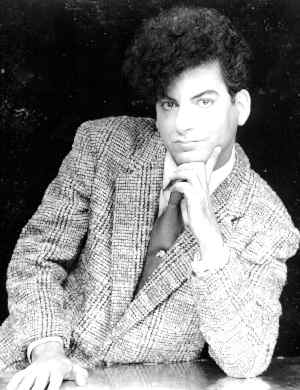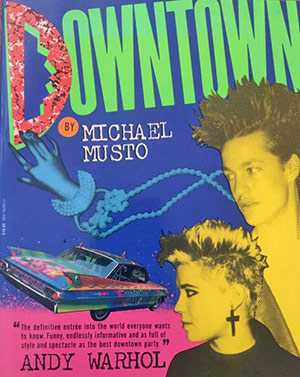© 1997 Rich Grzesiak, all rights reserved.

A 1986 close-up of the journalist better known to '97 TV viewers as a gossip commentator for the cable channel E's The Gossip Show:
The Voice at the Voice: Michael Musto
In the beginning of Celebrity Gossip was the Word, and then the Word passed to Earl Wilson and Hedda Hopper and Louella Parsons and Rex Reed and Liz Smith and Rhona Barrett and Entertainment Tonight. Somewhere in between there was Arthur Bell, the beloved, half-crazed, gossipist-cum-political-activist-entertainment columnist for The Village Voice.
Seriously! When nationally known entertainment journalist Bell died several years ago, there was wild speculation over Who Would Get The Power—Who Would Replace Arthur Bell, the Most Powerful Entertainment Columnist in the World?
Well, almost the most powerful; he did eventually die, you know. But along the way, he got a crack at two very unsuccessful books, publicly heckled Frank Sinatra at a press conference, helped launch the career of Bette Midler, tracked down a murderer who set people on fire after having sex with them, editorially assaulted film director William Friedkin, publicly quarreled with the late writer Merle Miller, implied (explicitly!) that the actress Dorothy Lamour was an old bag—and wrote some top flight hatchet jobs on any number of those other celebrities.
This Is What We Call Power. Bell became a brazen force to be reckoned with, feared by publicists, hated by stars. Who could follow that act with anywhere near the same amount of chutzpah?
Meet young (mid-20's) Michael Musto. Born in New York and educated at Columbia University (where he majored in English), he's not what he seems. According to New York writer Brandon Judell (once also rumored to be a shoo-in to replace Bell), "Musto's one of those Doctor Jekyll/Mister Hyde characters. He's got to be one of the quietest souls on the street. You put a spotlight on him and he freaks out.
Shy and retiring on the phone, well-mannered and demure on the street, Musto is anything but in print. He sums up his personal zeitgeist in the first paragraphs of his new book Downtown [Vintage;$10.95/softcover]: First, realize that there are no rules; you just look and do as you feel Above all, get bored so easily that by the time a trend you started becomes accepted, you should be willing to let someone else cash in on it just so you can move on to the next three trends. Always be a member of the vanguard, even if you have to pay dues to join.

For the last 20 months, he's paid his dues through "La Dolce Musto," the entertainment column of The Village Voice, one of the most widely read celebrity gossip columns in New York, a city not known for its encouragement of second rate talent in the entertainment business. Every week, he shoots a laser beam right into the fast track. Agents, editors, stars and schmucks—they would all give away anything just to be mentioned in his column. Those who don't stay his course either fade away—or leave town.
Which is exactly what Musto did shortly before I caught up with him. For a week he was off to London to do the punk rock clubs. While there, when he found out that his hotelier was not paying for room service, he fled to the airport—where he caused "the biggest scene since Tallulah Bankhead didn't get the movie of The Little Foxes" [sic]).
Sputtering back into the Big Apple, he was off to 3 movie premieres and a little-to-do for Anthony Michael Hall [the Saturday Night Live alumnus and star of the recent film flop Out of Bounds]. The guest of honor "showed up really late for his party and was drenched in champagne or sweat—I don't know what. He was totally incoherent. For Rodney Dangerfield to take a few swigs of vodka at a party—that's totally in character; he doesn't lose control. I don't know what Anthony was on, but he was totally gone and offended practically everyone at the party."
Then Musto was off to the Hamptons wherewell, you can just imagine what he did there, which, publicly recounted in a recent column, included his throwing up on Hedy Klineman's lawn ("I gave the gift that keeps giving").
He might be young and fey but Michael Musto is a power to be reckoned with. Certain celebrities won't even talk to him because they're terrified of the bad press they might get (Musto: "I was supposed to go on a weekend with Cher at Vassar College, and they wouldn't let me go because they thought I was too nasty"). Musto tacitly admits that "sometimes, dealing with celebrities, there are a couple of times where I thought I may have been a little bitchier than what I needed to be."
For example? "I once did a column on Faye Grant of the Broadway musical Singing in the Rain. I was just really irked at the show. And she wrote me a letter saying she wasn't too happy with what I wrote. In retrospect, maybe I got a little carried away butI've gotten a 90% positive response to my column.
Other editions of " La Dolce Musto" have been equally generous, castigating people for their handshakes, the way they held doors open, their comments to Musto, their drinking habits, their lifestyle, the quality of a hotel's room service (see above) and even one's hair. As a character in Downtown claims, "Walk around with a huge chip on your shoulder, but only if the chip looks fabulous."
Are these nothing more than fabulous chips off the block of the late, lamented, demented Arthur Bell? With pronounced humility, Musto tells me "that if I ever try to copy or equal what he [Bell] did, I would just go out of my mindI'm just trying to do my own thing."
Ever the charmer, Musto tells me that he once mailed to his predecessor columnist, who could easily be provoked, "an invitation that had confetti in the envelope—it got all over his livingroom rug. A duplicate arrived in the mail and he was just furious, and wrote me a really nasty letter!
Nasty or not, Musto feels that "secretly you deserve" to write a column like "La Dolce Musto.". According to The Columnist, "it's just the kind of column every writer would love to have I want my name there, I want to be read. I love the weekly grind" of turning out "La Dolce Musto."
The heavy duty political journalism of the Voice work to make many sections thereof essentially unappetizing to apolitical subscribers—people like agents, stars, celebrities? "I have to say," Musto has to say, "that I don't even read the front section of The Village Voice, which just may be my own frivolity. I'm more interested in the film reviews and the show-bizzy stuff. The paper is a forum for writers and their opinions. There's nobody saying that you have to fit into its format.
Yet while it may not be politically savvy to admit to disliking the Voice's political journalism, Musto is also smart enough to realize that "I can't imagine not doing this column for the Voice Any other magazine would ask me to tone it down or not be so outrageous or whatever. I'll say. Most other magazines would probably show Musto to the door.
Will readers be shocked to learn that not everyone loves Musto? His critics deride his flakiness, his bitchiness, his obsessions with no talent celebrity charlatans with punk hairdos. One such non-fan, Christopher Street columnist Boyd McDonald, charges that "Musto confines himself to the dance clubs. If that's what you do, your column is going to wind up being nothing more than a list of some pretty tiresome peopleHe's celebrity crazy! s like saying that a news reporter is 'news crazy'." He offers no apologies except to say that "I was hired as a showbiz and night life columnist."
But while Musto may be celebrity crazy, at least he's not crazed by them. He can size up a phony 100 miles away, and write some devastating take downs of their foibles. One of his columns goes on and on about bestselling writer "Judith Krantz, swathed in Carrington chic and giddily oblivious to bad reviews, laugh[ed] in the direction of the nearest safe deposit box. I asked her if anyone really lives like the people in her books. 'I do. In fact, I don't even write the books. They write themselves because I'm too busy being glamorous."
Or take his August 6th column, for example, the infamous one which gave us all the lowdown on his Hampton vomiting. It also throws up, if you will, the lovely singer/starlet/refugee from Prince, Vanity' s writhed a long way from the days when when she lived in a 42nd Street hotel and 'could shit, shine and shave in the same room. At least it was mine. Now I live in L.A.—Lord have mercy, that's a beautiful sucker—and I stay at the Helmsley Palace where they leave chocolates on your pillows, and I feel the same way about it. It's mine—the whole palace!' Get over it, dear, it's Leona's. s leave takedowns of vanity aside (ahem!). When we're talking about writers in New York, if you ain't got a film deal, forget it. Even salaries at The Village Voice pay for only so much rent. And rent in New York? In the Village? In Chelsea?
Musto, gaily but dejected: "Actually, I was trying to convert Downtown into a film scenario but everything comes out like Desperately Seeking Susan. And every movie coming out these days is based on that anyway. s a bad market this season for the showbiz division of Manhattan writers. Even the barbed witticisms of Jay MacInerney's elegantly cool Bright Lights, Big City probably won't get filmed despite Tom Cruise's [Top Gun] interest and Joel Schumacher's [St. Elmo's Fire] potential direction.
And how does a better known columnist protect his privacy when he wants a night on the town so he can cruise around away from the wandering eyes of Anthony Michael Hall's bodyguards? Musto: "I'm totally accessible. I'm out there for people to throw things at and abuse -- I've been a very good boy lately. I can go out and act like an idiot 'cause that's part of my job as long as I come up with a funny column. I mean I carry on and cause a scene and try to be part of the scene—as much as the scene itself.
Some scene, some guy. Musto may be big on La Dolce, but some of us find him wonderfully, brazenly confused about La Vita.
